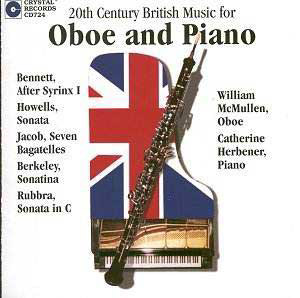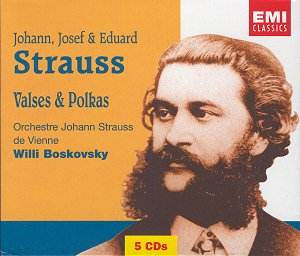 Composer: Richard Rodney Bennett (born 1936), Herbert Howells (1892 – 1983), Gordon Jacob (1895 – 1984), Lennox Berkeley (1903 – 1989), Edmund Rubbra (1901 – 1986)
Composer: Richard Rodney Bennett (born 1936), Herbert Howells (1892 – 1983), Gordon Jacob (1895 – 1984), Lennox Berkeley (1903 – 1989), Edmund Rubbra (1901 – 1986)
Works: After Syrinx I (1982), Oboe Sonata (1942), Seven Bagatelles (1970), Oboe Sonatina Op.61 (1962), Oboe Sonata in C Op.100 (1958)
Performers: William McMullen (oboe), Catherine Herbener (piano)
Recording: Kimball Recital Hall, University of Nebraska, May 1998 and May 1999
Label: Crystal Records CD 724
The recent release featuring works for oboe and piano showcases a distinguished selection of British composers, each contributing to the rich tapestry of chamber music. This collection is particularly notable for its inclusion of Herbert Howells’ Oboe Sonata, a work of remarkable lyricism composed during World War II. The sonata, originally intended for the illustrious Leon Goossens, ultimately premiered long after its inception, which speaks to the complex history surrounding its performance. The juxtaposition of wartime compositional urgency and pastoral beauty in Howells’ writing reflects both a personal and national narrative, thereby elevating this work beyond mere technical prowess.
William McMullen’s interpretation of Howells’ sonata is imbued with a sensitivity that honors its lyrical nature while maintaining a robust structural integrity. The first movement’s intricate interplay between oboe and piano reveals a seamless dialogue, with McMullen’s phrasing capturing the work’s emotional depth. The slow movement, marked by its haunting melodies, benefits from Catherine Herbener’s nuanced piano accompaniment, which provides a rich harmonic foundation against which the oboe’s soaring lines can shine. The balance between the two instruments is exemplary throughout, allowing the listener to appreciate the distinct character of each without overshadowing the other.
Edmund Rubbra’s Oboe Sonata in C Op.100 offers a counterpoint to Howells’ lyrical approach, presenting a more rigorous thematic exploration. McMullen navigates the work’s complex counterpoint with aplomb, particularly in the development sections where thematic transformation is paramount. The warmth of his tone blends beautifully with Herbener’s robust yet subtle piano lines, creating a vivid soundscape that draws the listener into Rubbra’s intricate musical world. The recording captures a palpable energy, with the engineering allowing for a pristine clarity that is essential for appreciating the detailed interplay of voices.
Richard Rodney Bennett’s After Syrinx I brings a contemporary perspective to the program, drawing from Debussy’s iconic work while exploring serial techniques. McMullen’s interpretation is marked by a fluidity that embraces both the modern and the lyrical, making the piece accessible yet intellectually engaging. The moments of dissonance are handled with care, providing a rich textural contrast to the more traditional works on the disc. The recording quality enhances this piece particularly well, allowing the subtleties of articulation and dynamics to emerge without interference.
Gordon Jacob’s Seven Bagatelles serves as a delightful interlude, with its short, characterful pieces showcasing a lighter side of the oboe repertoire. McMullen and Herbener imbue these miniatures with charm and humor, particularly in tracks like “Limerick,” where the playful interaction between the two instruments is delightful. Jacob’s craftsmanship shines through in these pieces, and the performers’ evident enjoyment adds an extra layer of appeal.
The engineering of this recording deserves special mention for its clarity and warmth, a testament to the skillful work of the production team. The absence of extraneous noise allows the intricate details of the performance to resonate, ensuring that the listener can fully engage with the musical dialogue.
This collection is a significant contribution to the oboe repertoire, showcasing the versatility and emotional depth of the instrument across a range of styles and historical contexts. McMullen and Herbener deliver performances that are both technically assured and deeply expressive, illuminating the distinct voices of each composer involved. The recording stands out not only for its artistic merit but also for its insightful programming, making it an essential listen for those interested in the evolution of British chamber music.


